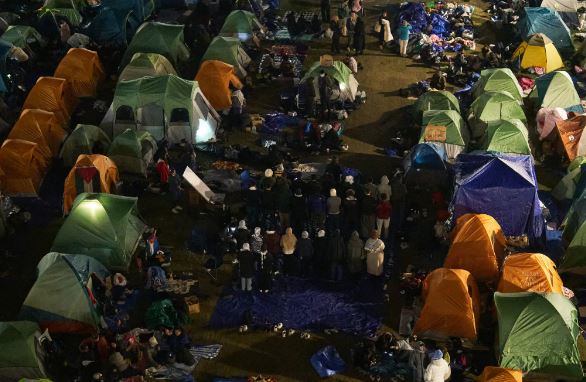Columbia University faced a tense standoff late on Tuesday as a deadline loomed for student protesters to dismantle their encampment, with the possibility of New York City police intervention if they refused to comply.
As the midnight deadline approached, uncertainty gripped the campus community regarding the fate of the encampment and whether the administration would proceed with clearing the grounds.
In a communication sent to the university just two hours before the deadline, Columbia’s president, Nemat Shafik, revealed ongoing discussions between university officials and student organizers in a last-ditch effort to reach a resolution before the cutoff time. She indicated that if an agreement could not be reached, the school would explore “alternative options” for addressing the encampment.
The standoff stemmed from a series of events nearly a week prior when Dr. Shafik made the controversial decision to involve city police officers outfitted in riot gear to forcibly remove over 100 activists who had set up the tent village in protest against Israel’s actions in Gaza. The move drew criticism from various quarters for Dr. Shafik’s handling of the situation, especially after the encampment resurged in size following its initial clearance.
As news of Dr. Shafik’s email spread among those gathered outside the campus gates, a sense of tension permeated the atmosphere, accompanied by chants regarding the impending midnight deadline.
On campus, student organizers informed the assembled protesters about the likelihood of a police sweep overnight and urged their peers to wear either a red or yellow band: red indicating willingness to be arrested and yellow signaling a desire to avoid arrest. Some students made preparations to leave, retrieving personal belongings from their tents in anticipation of potential intervention.
The escalation at Columbia mirrors a broader trend of heightened unrest at prestigious academic institutions across the country, particularly in the final weeks of the academic term. Instances of police intervention were reported at Yale and New York University earlier in the week, while encampments have sprung up at other universities such as Tufts, Emerson, and the University of California, Berkeley.
University administrators have grappled with the challenge of balancing students’ rights to free speech with the imperative to safeguard the well-being of Jewish students on campus. Some demonstrations have been marred by incidents of hate speech, threats, or expressions of support for Hamas, the militant group responsible for launching attacks on Israel in October, triggering the conflict in Gaza.
Within the Columbia community, dissent has been palpable, with some faculty members circulating a draft resolution to censure President Shafik for what they perceive as an “unprecedented assault on student rights.” Additionally, at least one prominent Jewish donor has withdrawn support from the university, citing concerns about insufficient measures to ensure student safety.
As tensions simmer and the deadline approaches, Columbia University finds itself at the center of a contentious debate over the limits of free expression on campus, underscoring the complex and nuanced challenges faced by academic institutions in navigating issues of political activism, student protest, and communal harmony.

